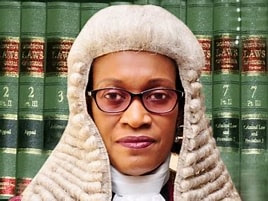Why Counsel Should Read Law Reports
Justice Ogunwumiju
One
unique feature of our law is that it is dynamic, always evolving to meet the
present needs of the society. It is therefore expected that a
good lawyer must be abreast with the latest position of the law especially as
it relates to areas of his/her specialty. It is common knowledge that case-law is
one of the veritable sources of law in our legal jurisprudence. Lawyers and law
student are often counselled to avail themselves of the benefits of reading law
reports. In fact, there are several benefit a young lawyer or law student
derives from reading law reports. This requirement, is by no means exclusive to
this class of persons. However, it is most beneficial to them. For one, it gives
the reader first-hand knowledge of the law as opposed a secondary source. It exposes
the reader to superior arguments and previous authorities decided on a
particular point of law. Also, it helps to polish the legal writing and
advocacy skills of the reader, giving him/her the flair in the use of legal
language and terminologies.
It
is painful and sometimes embarrassing to witness counsel being berated by their
Lordships, for avoidable slips while conducting their matter before the court.
Most often than not, it is due to their refusal or failure to acquaint themselves
with legal authorities. Mistakes or blunders of counsel may occur from time to
time. So, the courts, are usually not inclined to punish the parties for the
ignorance or mistake of their counsel. However, it should be noted that there
are times the court will allow the litigants to swim and drown with their
counsel. In Ndifon v C.O. P[1]
Per Peter-Odili, J.S.C had this to say, “all that the appellant is saying is
that the said defects in the notice of appeal before the court below were his
own mistakes and as such, this court should depart from its previous decisions
on that account and consequently set aside the judgement of the court below. My
humble opinion is that the position taken by the appellant’s counsel is highly
erroneous in law. In my view, an appellant in a criminal appeal is entitled to
brief a competent counsel with whom he either succeed or fail in his appeal.
Hence, where fundamental defect occurs in the conduct of an appeal by a counsel
whom an appellant has engaged for his case, the entire appeal shall fail as same
cannot be salvaged on the flimsy excuse of ‘mistake of counsel’ as contended by
the appellant’s counsel in this case. It is to be noted that there are times
when mistakes of counsel can be visited on the litigants.”
Among
the numerous of issues counsel face when confronted with a new case, is the issue
of the appropriate court to file an action. That is, which court to approach to
enforce a claim? this question is determined by the counsel alone without any input from the litigant because it is
a question of law. The importance of this question cannot be over emphasised because
it speaks to the issue of jurisdiction. The fact that jurisdiction is the bed
rock of litigation is a cliché that need no explanation. Where it is
lacking, there is want of competence on the part of the court to try the matter
and any proceedings embarked upon without the needed jurisdiction is usually a
nullity, and as a result, the matter and the entire proceeding will be aside on appeal notwithstanding how well it was conducted.
However,
in Nwanze v Nigerian Railway Corporation[2] the counsel for the
appellant failed in this all-important duty to properly ascertain the court
seised with requisite jurisdiction before commencing action and got himself
scorched by the remark of my lord, Justice Ogunwuniju JSC. Apparently, the
matter bothered on the appropriate court with jurisdiction where the claim
falls within jurisdiction of two courts. The court had long settled similar
issue to the intent that where a claim falls within the jurisdiction of two
courts, the jurisdiction over the principal claim is the proper court to
determine the matter.
Thus,
the appellant in Nwanze v Nigerian Railway Corporation (supra) brought
an action to enforce his fundamental right to fair hearing for being sacked
from his employment based on unsubstantiated allegation and for which his
employment with the respondent was terminated. The Supreme court reasoned that
the main grouse of the appellant was the issue of wrongful termination of
employment and therefore held that the trial court (State High court) lacked
jurisdiction over the appellant’s contract of employment because the respondent
is a Federal Government Agency. So, the first relief sought by the appellant on
his fundamental right to fair hearing, could not be determined in isolation of
the two other reliefs the appellant sought, in respect of the termination of
his employment. In the circumstances, the trial court lacked jurisdiction to
make the order sought in relief 3 reinstating the appellant to his former
employment.
Per Ogunwumiju, who delivered the leading
judgement in the case, berated the counsel for the appellant in the following
words “my lords, the issue of law on which this appeal turns to wit:
which is the appropriate venue to try this cause of action has been settled as
far back as Tukur v Govt of Gongola State (supra) in 1989. Also, by NEPA v.
Edegbero in 2002 this issue was also reinforced. For the counsel of the
appellant to file a suit at the wrong court in 2003 and to persist in it up to
this court leaves a lot to be desired. It shows that counsel has refused to
read the law report and has an abysmal knowledge of the law. In any event,
this appeal has absolutely no merit and it is hereby dismissed.
Since the appellant has been led down this unproductive path by learned counsel
who should know better, I will not award cost against the appellant” (emphasis
mine).
We
may as well assume that the counsel in this case took this arduous path because
he was trying to revive an action caught up statute of limitation. The
appellant waited 9 years after the cause of action arose to file a claim. The Supreme
court rightly held that the action had been extinguished and cannot be revived
by the trial court in the absence of any specific provision of the
Constitution, which confers or donate the right of action. The Fundamental
Human Right (Enforcement Procedure) Rules cannot extend the time provided for
the enforcement of the rights under the Nigerian Railway Corporation Act.
Augie
JSC pronouncement on this matter is more succinct and apt. According to him,
where a claim falls within the jurisdiction of two courts, the court with
jurisdiction over the main claim, is the proper court to determine the matter.
In this case, the appellant’s claim (relief 1) that touches on fair hearing, cannot
be determined in isolation of the two other reliefs sought, which has to do
with his employment. The respondent is a Federal Government Agency; therefore,
the State High court cannot look into contract of employment.
Nosakhare
Okuonghae
Legal
Practitioner/Legal Information Professional
nosakhareokuonsofficial@gmail.com



Comments
Post a Comment